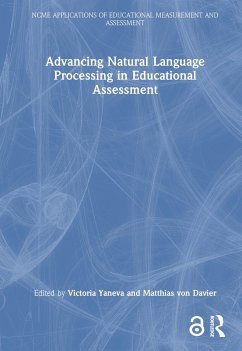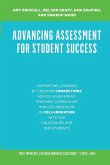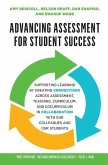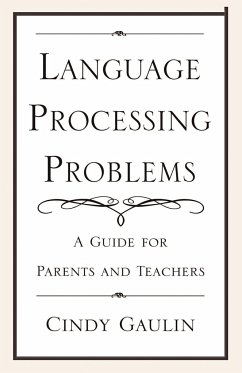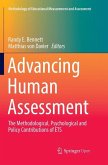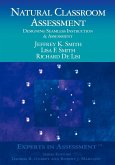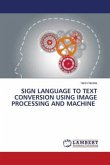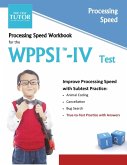Advancing Natural Language Processing in Educational Assessment
Herausgeber: Yaneva, Victoria; Davier, Matthias von
Advancing Natural Language Processing in Educational Assessment
Herausgeber: Yaneva, Victoria; Davier, Matthias von
- Gebundenes Buch
- Merkliste
- Auf die Merkliste
- Bewerten Bewerten
- Teilen
- Produkt teilen
- Produkterinnerung
- Produkterinnerung
Advancing Natural Language Processing in Educational Assessment examines the use of natural language technology in educational testing, measurement, and assessment.
Andere Kunden interessierten sich auch für
![Advancing Assessment for Student Success Advancing Assessment for Student Success]() Amy DriscollAdvancing Assessment for Student Success198,99 €
Amy DriscollAdvancing Assessment for Student Success198,99 €![Advancing Assessment for Student Success Advancing Assessment for Student Success]() Amy DriscollAdvancing Assessment for Student Success51,99 €
Amy DriscollAdvancing Assessment for Student Success51,99 €![Language Processing Problems Language Processing Problems]() Cindy GaulinLanguage Processing Problems19,99 €
Cindy GaulinLanguage Processing Problems19,99 €![Advancing Human Assessment Advancing Human Assessment]() Advancing Human Assessment40,99 €
Advancing Human Assessment40,99 €![Natural Classroom Assessment Natural Classroom Assessment]() Jeffrey K. SmithNatural Classroom Assessment32,99 €
Jeffrey K. SmithNatural Classroom Assessment32,99 €![SIGN LANGUAGE TO TEXT CONVERSION USING IMAGE PROCESSING AND MACHINE SIGN LANGUAGE TO TEXT CONVERSION USING IMAGE PROCESSING AND MACHINE]() Harini NerellaSIGN LANGUAGE TO TEXT CONVERSION USING IMAGE PROCESSING AND MACHINE30,99 €
Harini NerellaSIGN LANGUAGE TO TEXT CONVERSION USING IMAGE PROCESSING AND MACHINE30,99 €![Processing Speed Workbook for the WPPSI-IV Test Processing Speed Workbook for the WPPSI-IV Test]() The Test TutorProcessing Speed Workbook for the WPPSI-IV Test108,99 €
The Test TutorProcessing Speed Workbook for the WPPSI-IV Test108,99 €-
-
-
Advancing Natural Language Processing in Educational Assessment examines the use of natural language technology in educational testing, measurement, and assessment.
Hinweis: Dieser Artikel kann nur an eine deutsche Lieferadresse ausgeliefert werden.
Hinweis: Dieser Artikel kann nur an eine deutsche Lieferadresse ausgeliefert werden.
Produktdetails
- Produktdetails
- Verlag: Routledge
- Seitenzahl: 262
- Erscheinungstermin: 5. Juni 2023
- Englisch
- Abmessung: 260mm x 183mm x 19mm
- Gewicht: 694g
- ISBN-13: 9781032203904
- ISBN-10: 1032203900
- Artikelnr.: 67514840
- Herstellerkennzeichnung
- Libri GmbH
- Europaallee 1
- 36244 Bad Hersfeld
- gpsr@libri.de
- Verlag: Routledge
- Seitenzahl: 262
- Erscheinungstermin: 5. Juni 2023
- Englisch
- Abmessung: 260mm x 183mm x 19mm
- Gewicht: 694g
- ISBN-13: 9781032203904
- ISBN-10: 1032203900
- Artikelnr.: 67514840
- Herstellerkennzeichnung
- Libri GmbH
- Europaallee 1
- 36244 Bad Hersfeld
- gpsr@libri.de
Victoria Yaneva is Senior NLP Scientist at the National Board of Medical Examiners, USA. Matthias von Davier is Monan Professor of Education in the Lynch School of Education and Executive Director of TIMSS & PIRLS International Study Center at Boston College, USA.
Preface
by Victoria Yaneva and Matthias von Davier
Section I: Automated Scoring
Chapter 1: The Role of Robust Software in Automated Scoring
by Nitin Madnani, Aoife Cahill, and Anastassia Loukina
Chapter 2: Psychometric Considerations when Using Deep Learning for
Automated Scoring
by Susan Lottridge, Chris Ormerod, and Amir Jafari
Chapter 3: Speech Analysis in Assessment
by Jared C. Bernstein and Jian Cheng
Chapter 4: Assessment of Clinical Skills: A Case Study in Constructing an
NLP-Based Scoring System for Patient Notes
by Polina Harik, Janet Mee, Christopher Runyon, and Brian E. Clauser
Section II: Item Development
Chapter 5: Automatic Generation of Multiple-Choice Test Items from
Paragraphs Using Deep Neural Networks
by Ruslan Mitkov, Le An Ha, Halyna Maslak, Tharindu Ranasinghe, and
Vilelmini Sosoni
Chapter 6: Training Optimus Prime, M.D.: A Case Study of Automated Item
Generation using Artificial Intelligence - From Fine-Tuned GPT2 to GPT3 and
Beyond
by Matthias von Davier
Chapter 7: Computational Psychometrics for Digital-first Assessments: A
Blend of ML and Psychometrics for Item Generation and Scoring
by Geoff LaFlair, Kevin Yancey, Burr Settles, Alina A von Davier
Section III: Validity and Fairness
Chapter 8: Validity, Fairness, and Technology-based Assessment
by Suzanne Lane
Chapter 9: Evaluating Fairness of Automated Scoring in Educational
Measurement
by Matthew S. Johnson and Daniel F. McCaffrey
Section IV: Emerging Technologies
Chapter 10: Extracting Linguistic Signal from Item Text and Its Application
to Modeling Item Characteristics
by Victoria Yaneva, Peter Baldwin, Le An Ha, and Christopher Runyon
Chapter 11: Stealth Literacy Assessment: Leveraging Games and NLP in iSTART
by Ying Fang, Laura K. Allen, Rod D. Roscoe, and Danielle S. McNamara
Chapter 12: Measuring Scientific Understanding Across International
Samples: The Promise of Machine Translation and NLP-based Machine Learning
Technologies
by Minsu Ha and Ross H. Nehm
Chapter 13: Making Sense of College Students' Writing Achievement and
Retention with Automated Writing Evaluation
by Jill Burstein, Daniel McCaffrey, Steven Holtzman & Beata Beigman
Klebanov
Contributor Biographies
by Victoria Yaneva and Matthias von Davier
Section I: Automated Scoring
Chapter 1: The Role of Robust Software in Automated Scoring
by Nitin Madnani, Aoife Cahill, and Anastassia Loukina
Chapter 2: Psychometric Considerations when Using Deep Learning for
Automated Scoring
by Susan Lottridge, Chris Ormerod, and Amir Jafari
Chapter 3: Speech Analysis in Assessment
by Jared C. Bernstein and Jian Cheng
Chapter 4: Assessment of Clinical Skills: A Case Study in Constructing an
NLP-Based Scoring System for Patient Notes
by Polina Harik, Janet Mee, Christopher Runyon, and Brian E. Clauser
Section II: Item Development
Chapter 5: Automatic Generation of Multiple-Choice Test Items from
Paragraphs Using Deep Neural Networks
by Ruslan Mitkov, Le An Ha, Halyna Maslak, Tharindu Ranasinghe, and
Vilelmini Sosoni
Chapter 6: Training Optimus Prime, M.D.: A Case Study of Automated Item
Generation using Artificial Intelligence - From Fine-Tuned GPT2 to GPT3 and
Beyond
by Matthias von Davier
Chapter 7: Computational Psychometrics for Digital-first Assessments: A
Blend of ML and Psychometrics for Item Generation and Scoring
by Geoff LaFlair, Kevin Yancey, Burr Settles, Alina A von Davier
Section III: Validity and Fairness
Chapter 8: Validity, Fairness, and Technology-based Assessment
by Suzanne Lane
Chapter 9: Evaluating Fairness of Automated Scoring in Educational
Measurement
by Matthew S. Johnson and Daniel F. McCaffrey
Section IV: Emerging Technologies
Chapter 10: Extracting Linguistic Signal from Item Text and Its Application
to Modeling Item Characteristics
by Victoria Yaneva, Peter Baldwin, Le An Ha, and Christopher Runyon
Chapter 11: Stealth Literacy Assessment: Leveraging Games and NLP in iSTART
by Ying Fang, Laura K. Allen, Rod D. Roscoe, and Danielle S. McNamara
Chapter 12: Measuring Scientific Understanding Across International
Samples: The Promise of Machine Translation and NLP-based Machine Learning
Technologies
by Minsu Ha and Ross H. Nehm
Chapter 13: Making Sense of College Students' Writing Achievement and
Retention with Automated Writing Evaluation
by Jill Burstein, Daniel McCaffrey, Steven Holtzman & Beata Beigman
Klebanov
Contributor Biographies
Preface
by Victoria Yaneva and Matthias von Davier
Section I: Automated Scoring
Chapter 1: The Role of Robust Software in Automated Scoring
by Nitin Madnani, Aoife Cahill, and Anastassia Loukina
Chapter 2: Psychometric Considerations when Using Deep Learning for
Automated Scoring
by Susan Lottridge, Chris Ormerod, and Amir Jafari
Chapter 3: Speech Analysis in Assessment
by Jared C. Bernstein and Jian Cheng
Chapter 4: Assessment of Clinical Skills: A Case Study in Constructing an
NLP-Based Scoring System for Patient Notes
by Polina Harik, Janet Mee, Christopher Runyon, and Brian E. Clauser
Section II: Item Development
Chapter 5: Automatic Generation of Multiple-Choice Test Items from
Paragraphs Using Deep Neural Networks
by Ruslan Mitkov, Le An Ha, Halyna Maslak, Tharindu Ranasinghe, and
Vilelmini Sosoni
Chapter 6: Training Optimus Prime, M.D.: A Case Study of Automated Item
Generation using Artificial Intelligence - From Fine-Tuned GPT2 to GPT3 and
Beyond
by Matthias von Davier
Chapter 7: Computational Psychometrics for Digital-first Assessments: A
Blend of ML and Psychometrics for Item Generation and Scoring
by Geoff LaFlair, Kevin Yancey, Burr Settles, Alina A von Davier
Section III: Validity and Fairness
Chapter 8: Validity, Fairness, and Technology-based Assessment
by Suzanne Lane
Chapter 9: Evaluating Fairness of Automated Scoring in Educational
Measurement
by Matthew S. Johnson and Daniel F. McCaffrey
Section IV: Emerging Technologies
Chapter 10: Extracting Linguistic Signal from Item Text and Its Application
to Modeling Item Characteristics
by Victoria Yaneva, Peter Baldwin, Le An Ha, and Christopher Runyon
Chapter 11: Stealth Literacy Assessment: Leveraging Games and NLP in iSTART
by Ying Fang, Laura K. Allen, Rod D. Roscoe, and Danielle S. McNamara
Chapter 12: Measuring Scientific Understanding Across International
Samples: The Promise of Machine Translation and NLP-based Machine Learning
Technologies
by Minsu Ha and Ross H. Nehm
Chapter 13: Making Sense of College Students' Writing Achievement and
Retention with Automated Writing Evaluation
by Jill Burstein, Daniel McCaffrey, Steven Holtzman & Beata Beigman
Klebanov
Contributor Biographies
by Victoria Yaneva and Matthias von Davier
Section I: Automated Scoring
Chapter 1: The Role of Robust Software in Automated Scoring
by Nitin Madnani, Aoife Cahill, and Anastassia Loukina
Chapter 2: Psychometric Considerations when Using Deep Learning for
Automated Scoring
by Susan Lottridge, Chris Ormerod, and Amir Jafari
Chapter 3: Speech Analysis in Assessment
by Jared C. Bernstein and Jian Cheng
Chapter 4: Assessment of Clinical Skills: A Case Study in Constructing an
NLP-Based Scoring System for Patient Notes
by Polina Harik, Janet Mee, Christopher Runyon, and Brian E. Clauser
Section II: Item Development
Chapter 5: Automatic Generation of Multiple-Choice Test Items from
Paragraphs Using Deep Neural Networks
by Ruslan Mitkov, Le An Ha, Halyna Maslak, Tharindu Ranasinghe, and
Vilelmini Sosoni
Chapter 6: Training Optimus Prime, M.D.: A Case Study of Automated Item
Generation using Artificial Intelligence - From Fine-Tuned GPT2 to GPT3 and
Beyond
by Matthias von Davier
Chapter 7: Computational Psychometrics for Digital-first Assessments: A
Blend of ML and Psychometrics for Item Generation and Scoring
by Geoff LaFlair, Kevin Yancey, Burr Settles, Alina A von Davier
Section III: Validity and Fairness
Chapter 8: Validity, Fairness, and Technology-based Assessment
by Suzanne Lane
Chapter 9: Evaluating Fairness of Automated Scoring in Educational
Measurement
by Matthew S. Johnson and Daniel F. McCaffrey
Section IV: Emerging Technologies
Chapter 10: Extracting Linguistic Signal from Item Text and Its Application
to Modeling Item Characteristics
by Victoria Yaneva, Peter Baldwin, Le An Ha, and Christopher Runyon
Chapter 11: Stealth Literacy Assessment: Leveraging Games and NLP in iSTART
by Ying Fang, Laura K. Allen, Rod D. Roscoe, and Danielle S. McNamara
Chapter 12: Measuring Scientific Understanding Across International
Samples: The Promise of Machine Translation and NLP-based Machine Learning
Technologies
by Minsu Ha and Ross H. Nehm
Chapter 13: Making Sense of College Students' Writing Achievement and
Retention with Automated Writing Evaluation
by Jill Burstein, Daniel McCaffrey, Steven Holtzman & Beata Beigman
Klebanov
Contributor Biographies

